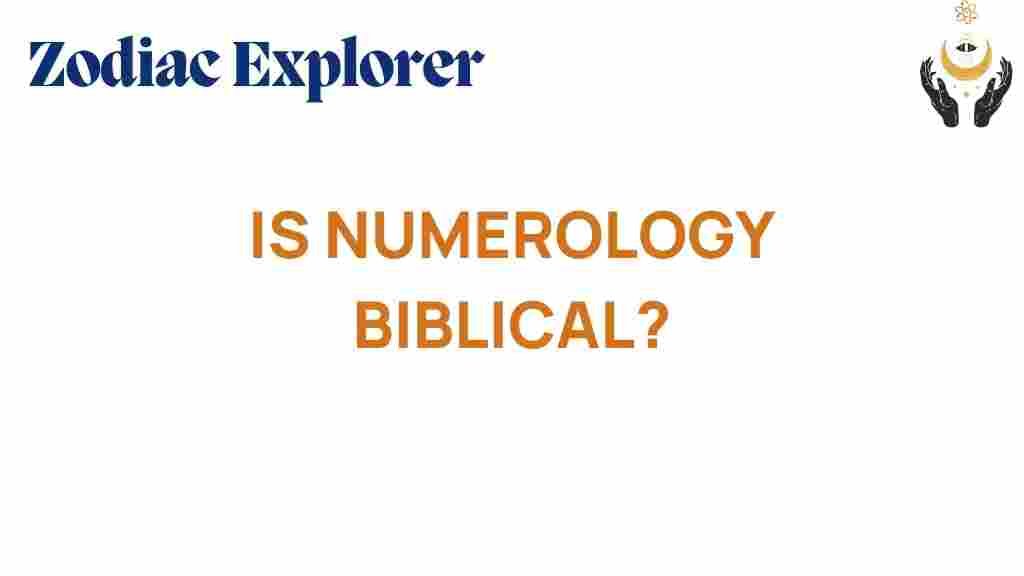Unraveling the Mystique: Is Numerology Biblical?
The study of numerology has intrigued many for centuries, offering insights and interpretations through numbers. But does it hold a place in the context of the biblical tradition? This article explores the intersection of numerology and biblical texts, delving into the spiritual significance of numbers, their symbolism, and their role in ancient scriptures.
Understanding Numerology
Numerology is the belief that numbers hold mystical significance and can influence human life and events. It is often used as a method of divination, helping individuals interpret their destinies through numbers derived from their names and birth dates. While numerology has roots in various cultures, its relationship with spirituality and ancient texts like the Bible raises interesting questions.
The Biblical Context of Numbers
Numbers play a significant role in the Bible, often representing concepts or divine truths. For example, the number 7 is frequently associated with completeness and perfection, as seen in the creation story where God created the world in six days and rested on the seventh. Other numbers, such as 12 (representing the twelve tribes of Israel) and 40 (often associated with periods of trial or testing), also carry profound meanings.
Key Numbers in the Bible
Here are some notable numbers found in biblical texts:
- 1: Represents unity and the oneness of God.
- 3: Symbolizes the Holy Trinity—Father, Son, and Holy Spirit.
- 7: Indicates divine perfection and completion.
- 12: Represents God’s authority and governance.
- 40: Associated with testing and preparation, such as during the Israelites’ 40 years in the wilderness.
Numerology and Spirituality
The practice of numerology often intersects with various aspects of spirituality. Many believe that numbers can provide insights into personal growth and understanding one’s life path. In a spiritual context, numerology can serve as a tool for self-discovery and enlightenment, helping individuals align with their true purpose.
Is Numerology Considered Biblical?
To determine whether numerology is biblical, we must consider the origins and teachings of the Bible. While the Bible contains instances of numbers being used symbolically, it does not explicitly endorse the practice of numerology as a system of divination. Instead, the focus is primarily on faith and trust in God rather than on interpreting numbers to predict the future.
The Role of Numbers in Ancient Texts
Ancient texts, including those of the Bible, often utilized numbers as a means of conveying deeper meanings and teachings. In many cultures, numbers were seen as more than mere quantities; they were imbued with spiritual significance. This is evident in various literary works, where numbers are employed to symbolize concepts.
Interpreting Numbers in a Biblical Framework
When interpreting numbers within a biblical framework, it is essential to approach the texts with an understanding of their cultural and historical context. Here are some steps to consider:
- Study the Text: Read the passages where specific numbers appear. Look for patterns or repeated usage.
- Contextual Analysis: Consider the context of the numbers. What events are associated with them? What themes emerge?
- Symbolic Meanings: Research the symbolic meanings attributed to numbers in biblical scholarship.
- Prayer and Reflection: Seek guidance through prayer to understand how these numbers might relate to your spiritual journey.
Troubleshooting Misconceptions
As with any topic, there are misconceptions regarding numerology and its connection to the Bible. Here are some common misunderstandings and clarifications:
- Misconception: All numbers have a specific meaning in the Bible.
Clarification: While some numbers are significant, not all numbers carry specific symbolism. - Misconception: Numerology is explicitly endorsed in the Bible.
Clarification: The Bible warns against divination practices that seek to predict the future outside of faith in God. - Misconception: Numerology is a replacement for faith.
Clarification: Numerology should not replace a personal relationship with God or the teachings of the Bible.
Conclusion: The Relationship Between Numerology and the Bible
In conclusion, while numerology offers intriguing insights into the mystical significance of numbers, its direct alignment with biblical teachings is complex. The Bible does utilize numbers symbolically, but it does not endorse numerology as a definitive practice for understanding one’s fate. Instead, the focus remains on faith, spirituality, and the belief in divine guidance.
For those interested in exploring the relationship between numerology and biblical teachings, it is essential to approach the subject with an open mind and a foundation of faith. By understanding the symbolism of numbers within the biblical context, individuals can gain a richer understanding of their spiritual journeys.
For more information on biblical numerology and its implications, you can explore additional resources here. If you’re looking to dive deeper into spiritual practices, consider visiting this site for guidance.
Ultimately, whether one views numerology as a tool for personal exploration or a mere curiosity, its connection to biblical spirituality invites reflection on the profound significance of numbers in our lives.
This article is in the category Myths and created by ZodiacExplorer Team

2 thoughts on “Unraveling the Mystique: Is Numerology Biblical?”